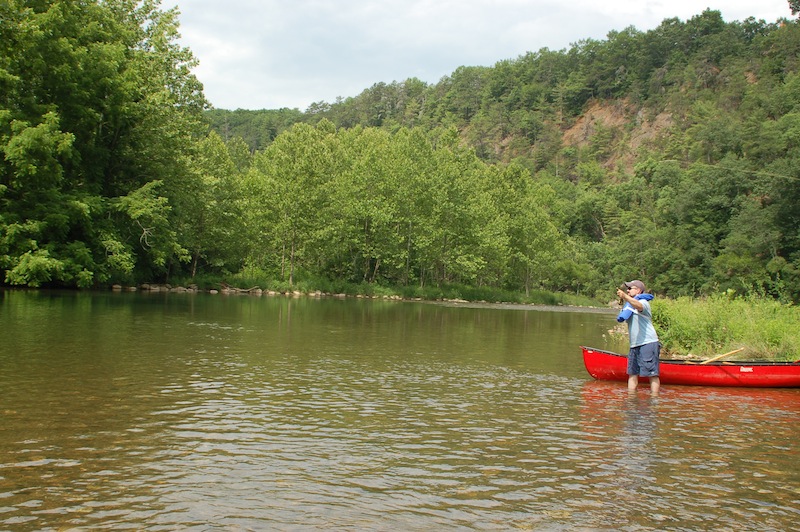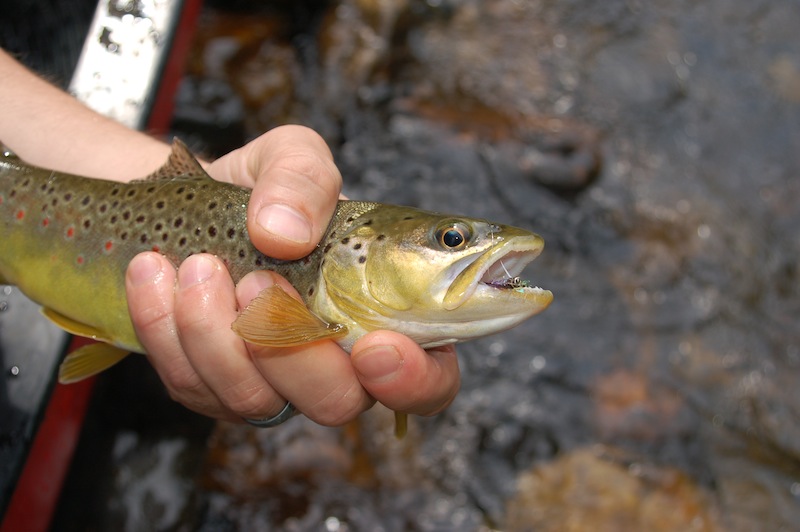Update: October 11, 2012
Case on Virginia river access ends when defendants concede they ...
Washington Post (October 10, 2012)
A lawsuit that sparked a running debate over property rights and public when they got out of their boats to cast for trout in the Jackson River.
Fishermen lose court fight for access to Va. river
NECN (October 10, 2012)
... barred from wading on a contested section of the Jackson River after a judge saying it had no business intervening in a private trespassing lawsuit.
Fishermen lose court fight for access to Va. river
WRIC (October 10, 2012)
(AP) - Two fishermen accused of trespassing by wading the Jackson River in up legal bills fighting a trespassing lawsuit filed by the landowners.
Who Owns Virginia Rivers
Bruce Ingram
In August of 2010, Charlottesville’s Dargen Coggeshall and Roanoke’s Charlie Crawford launched their kayaks from Smith Bridge, a public access point on the Jackson River tailrace trout fishery eight miles below Lake Moomaw. At the U.S. Forest Service access point, a government sign stated that the river is open to the public.
Downstream, The River’s Edge, a golf course and housing development, had placed signs stating that the Jackson was private and that stopping, wading, and fishing are not permitted. Along this stretch, Karen Feldenzer, one of the landowners, filmed the two men.

“We received a summons for criminal trespass, a Class I misdemeanor, several weeks after Karen Feldenzer filmed Charlie and me,” Coggeshall said. “Pastor Frank Garden wasn't with us that day, but had been with us on a float two months earlier where we were checked for fishing licenses by a deputy sheriff who had been called by another River’s Edge landowner, Frank Sponaugle, to respond to a trespass complaint.
“The deputy sheriff said he was not going to cite me for trespass, but would check my license, then said I could return to fishing, which I did. We assume the plaintiffs got our names from that deputy from the June license check. Mrs. Feldenzer filed the criminal complaint with the magistrate two days after photographing us in the river in August of 2010. The General District Court judge dismissed the criminal charges in October 2010. The civil summons (seeking damages of $10,000) showed up in February of 2011. We've been fighting it ever since.”
The basis for the landowner’s charge is King’s Grants and here some history is in order. In 1750, for example, King George II issued crown grants to Virginia landowners and in 1769, his grandson King George III did the same. Other grants have been issued as well.
“The plaintiffs have a Crown Grant from 1743 and a Commonwealth Grant from 1785,” Coggeshall said. “Few Crown Grants, (including the one in possession of the plaintiffs) explicitly mention the river bottom, unless the property granted went across the river. In grants of larger parcels, where there were non-navigable streams on the property, you will often see language that specifies all the water courses therein are included.
“From 1780 to 1792 in eastern Virginia and in 1802 in western Virginia, the legislature passed a statute that prevented the river bottoms from being conveyed and said that all rivers are the property of the Commonwealth, unless otherwise conveyed. We are arguing that the crown grant the plaintiffs possess doesn't specifically convey the river bottom. There is no language to suggest it does. If we lose, then virtually any property owner with a grant could sue a user, whether that grant mentions the river bottom or not.”
 Historically, Virginia streambeds have either been owned by the public or privately. Generally, navigable rivers have been considered public property for all to use, that is, for example, fishing and boating. Smaller, non-navigable streams flowing through private land (and their stream bottoms) have been considered to be owned by those landowners. Those earlier private landowners came to own those properties, either because they purchased them from the state, because other earlier landowners received them as grants from the state in the past, or because earlier landowners received crown grants from the two King Georges.
Historically, Virginia streambeds have either been owned by the public or privately. Generally, navigable rivers have been considered public property for all to use, that is, for example, fishing and boating. Smaller, non-navigable streams flowing through private land (and their stream bottoms) have been considered to be owned by those landowners. Those earlier private landowners came to own those properties, either because they purchased them from the state, because other earlier landowners received them as grants from the state in the past, or because earlier landowners received crown grants from the two King Georges.
The above is an oversimplification of a complex issue, which definitely is an incredibly complicated issue, one that has ramifications regarding the future of fishing in Virginia and in perhaps the United States. After all, not only were King’s Grants issued from England but Spanish kings also issued grants, as did the Mexican government, in what is today the western United States. Could, for example, a landowner in New Mexico have an angler arrested because the individual was fishing in a river flowing through land that had been part of a Spanish or Mexican grant?
“I don't know what the call to action is going to be for Virginia Ike members, but we are in desperate need of donations to continue the defense,” Coggeshall said. “We've accumulated over $120,000 in legal and research expenses, but only raised about $55,000 to date. We have accepted the fact that the Attorney General Ken Cuccinelli, an Ike member, is not going to take the case and protect the asset of the Commonwealth, so the burden of funding the defense falls on our shoulders.”
To gain more insight into this issue, this writer interviewed Dargen Coggeshall at the July 10 meeting of the Roanoke Ike Chapter. Coggeshall was there to talk about the Jackson River controversy. He began his presentation with these poignant questions.
“How many people here have floated a Virginia river open to the public? How many people here have put in at a public access point paid for by your tax dollars? How many people here have been arrested by committing either of these two acts?”
After the first two questions, almost all the Ikes raised their hands; after the third one, no one did.
“If I can be forced to go to court to defend doing what I did – having a valid fishing license, following the laws of the state of Virginia, and fishing in a public river, then the same thing could happen to you in the future.”
Coggeshall added that a “whole inventory of rivers exist” in the Old Dominion that have King’s Grants associated with them, among the waterways are the Cowpasture, James, Shenandoah, and Rappahannock. The latter three are among the most popular and heavily used waterways in the state for anglers, paddlers, and recreationists of all persuasions.
“If this case is settled the wrong way, you could see hundreds and hundreds of landowners who could possibly go to court to assert their King’s Grant rights,” Coggeshall concluded.”
To learn more about this issue: Virginia Rivers Defense Fund, www.virginiariversdefensefund.org
